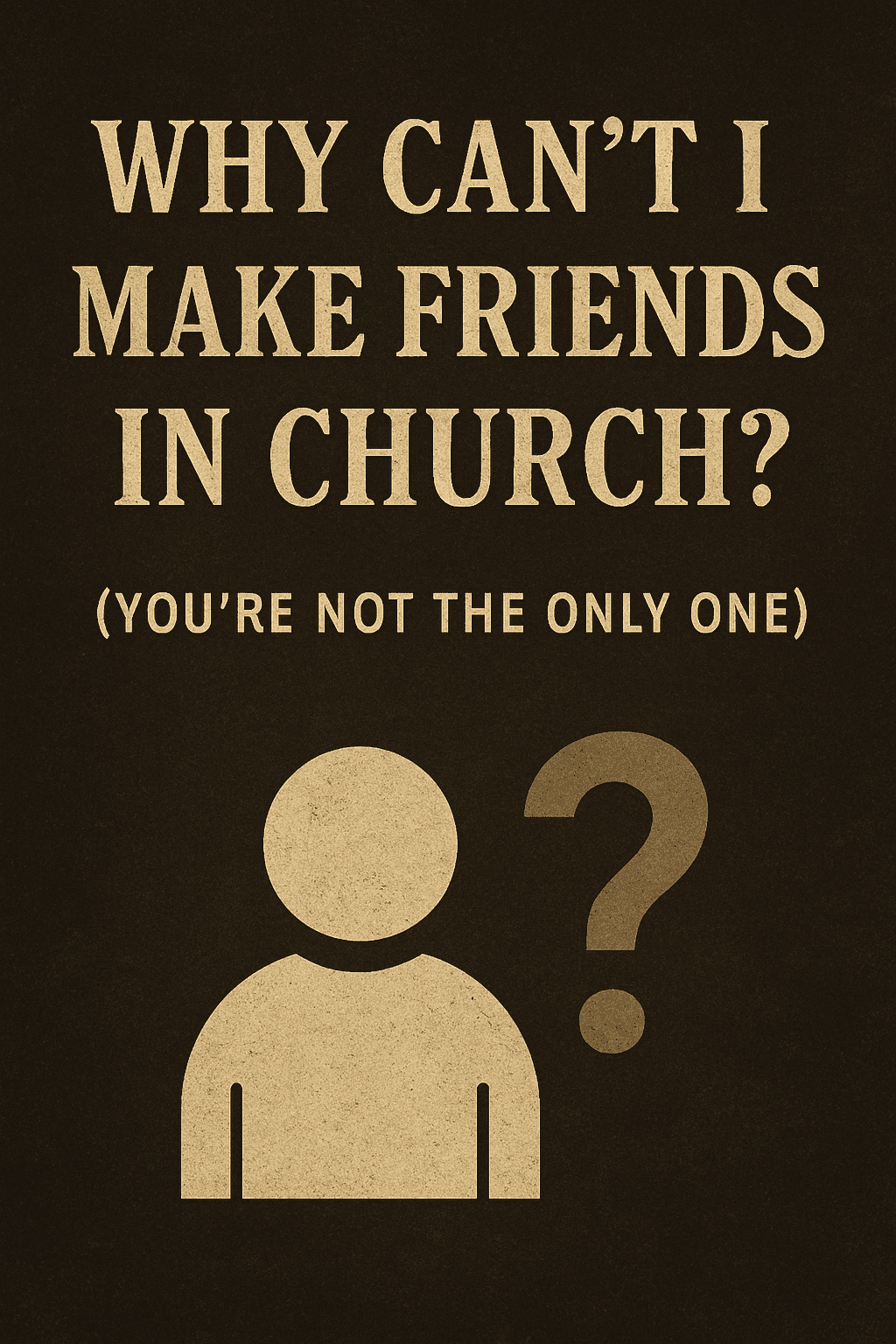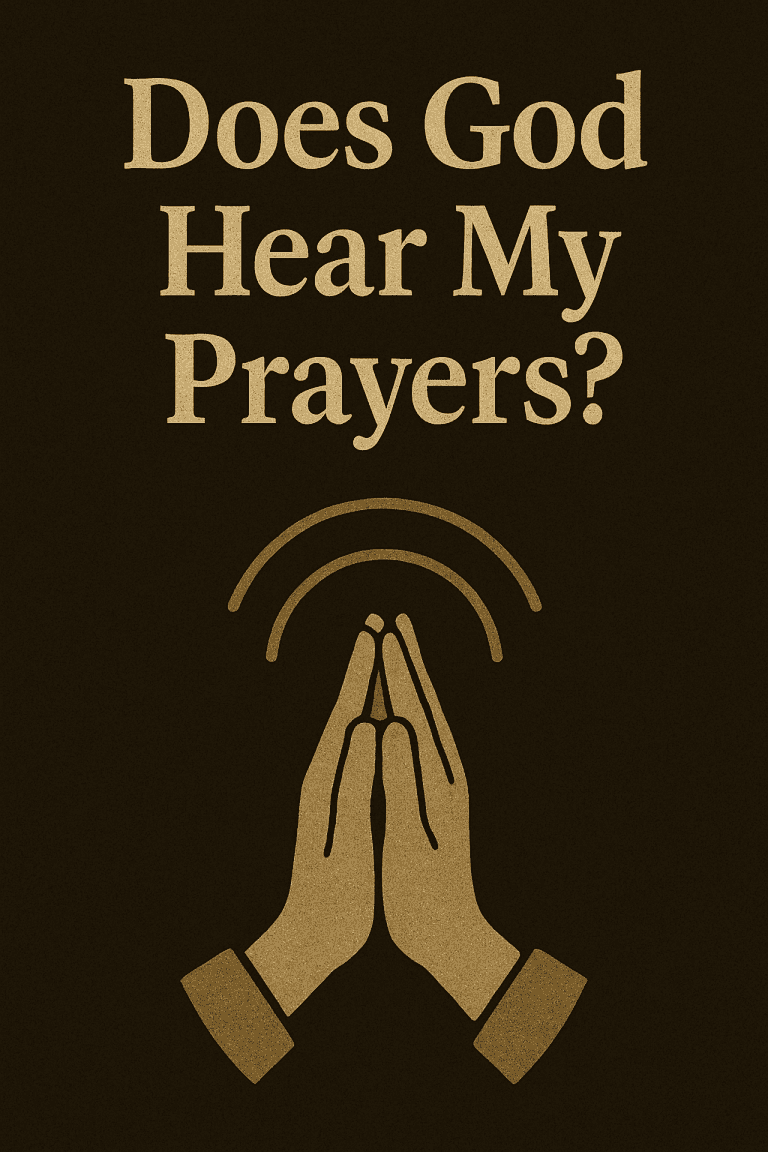Why Can’t I Make Friends in Church? (You’re Not the Only One)
There’s something frustrating about walking into a church, sitting through the service, and leaving without a single meaningful conversation. Week after week, you see groups of people talking, laughing, and making plans—while you wonder, Why can’t I make friends in church?

Understanding Fear, Self-Doubt, and Biblical Friendship
There’s something frustrating about walking into a church, sitting through the service, and leaving without a single meaningful conversation. Week after week, you see groups of people talking, laughing, and making plans—while you wonder, Why can’t I seem to make friends here?
Maybe you’ve tried, but your efforts felt awkward. Maybe you’ve convinced yourself that no one really wants to get to know you. Or maybe—without realizing it—you’ve been waiting for someone else to make the first move.
Let’s be honest: making friends as an adult is hard. Making friends in church? That should be easier—but for many, it isn’t.
So, why does this happen? And more importantly, what does Scripture say about it?
The Silent Struggle: Fear and Self-Doubt
For some of us, the biggest obstacle to making friends isn’t the church—it’s us.
We hesitate to reach out because we assume others are already too busy, too close-knit, or too important to notice us. We convince ourselves that people don’t need us in their lives. We let fear of rejection keep us silent, and then we wonder why we feel lonely.
Paul addressed this kind of thinking head-on:
“Let nothing be done through selfish ambition or conceit, but in lowliness of mind let each esteem others better than himself.” — Philippians 2:3
That verse is usually read as a warning against pride, but it applies just as much to self-doubt. When we assume others are “too good” for us, or that we have nothing valuable to offer in friendship, we aren’t walking in truth.
God doesn’t see us as unworthy of connection, and neither should we.
The Fear of Reaching Out

Some people struggle with shyness. Others are afraid of rejection. Some have been hurt before—maybe even by people in church—and they’re hesitant to try again.
But Scripture makes it clear that we’re called to be proactive in relationships. If we want deep, meaningful friendships, we have to step out in faith.
“A man who has friends must himself be friendly, but there is a friend who sticks closer than a brother.” — Proverbs 18:24
It’s easy to fall into the trap of waiting for others to reach out first. But that’s not how biblical relationships work. Jesus set the example for us—He didn’t wait for sinners to come to Him. He pursued them. He invited them in. He demonstrated love first.
If we want to form Christ-honoring friendships, we have to be willing to take that first step—even when it feels uncomfortable.
Why Can’t I Make Friends in Church – Stop Judging Yourself—And Others
Another reason we struggle with friendships in church? Judgment.
Sometimes we judge ourselves:
- I don’t belong here.
- They wouldn’t want to be my friend.
- I have nothing in common with them.
Other times, we judge others:
- They already have their friend group.
- They’re too busy for me.
- They’re not the kind of people I’d get along with.
Both attitudes create walls where God intends bridges. The truth is, every believer—no matter how “put together” they seem—needs real relationships.
James gives us a strong warning about making assumptions based on appearances:
“My brethren, do not hold the faith of our Lord Jesus Christ, the Lord of glory, with partiality.” — James 2:1
And Paul reminds us:
“Let each of you look out not only for his own interests, but also for the interests of others.” — Philippians 2:4
We’re called to be active participants in our church communities. That means stepping beyond our comfort zones, reaching out, and choosing to see others as God sees them—without pre-judging who is or isn’t “friend material.”
Friendship Requires Investment
In today’s culture, we expect relationships to come easily. We want instant connection, deep conversations, and shared experiences without putting in the work. But real friendships—the kind that last—take effort.
Look at the early church:
“And they continued steadfastly in the apostles’ doctrine and fellowship, in the breaking of bread, and in prayers.” — Acts 2:42
Notice the key word: steadfastly. They didn’t just show up to the occasional event and expect deep relationships to happen. They committed to being present, engaging in fellowship, and actively participating in the body of Christ.
If we want real friendships, we have to do the same.
Practical Steps to Build Friendships in Church

- Start small. Say hello to someone new. Ask about their week. Be intentional in your interactions.
- Join a Bible study or small group. Large church settings can be intimidating—find smaller gatherings where real conversations happen and it’s easier to make friends in church.
- Serve in a ministry. Friendships grow naturally when we work alongside others for a shared purpose.
- Pray for connections. Ask God to open doors for friendships and give you the courage to step through them.
- Follow up. If you have a good conversation with someone, don’t let it end there. Exchange contact information, invite them to coffee, and take the next step toward friendship.
Friendship Starts with You
At the end of the day, church isn’t about walking in, hearing a sermon, and walking out. It’s about being the body of Christ. And the body can’t function if its members stay disconnected.
If you’re struggling to make friends in church, start by asking yourself:
- Am I waiting for others to reach out to me instead of taking initiative?
- Have I let fear, self-doubt, or judgment keep me from building relationships?
- Am I willing to invest in others, even if it takes time and effort?
You don’t need to be the most outgoing person in the room to form godly friendships. You just need to be willing to take the first step.
Because when we step out in faith, God meets us there. Got questions? Drop me a line and we can look at this issue through the lens of the Bible. If you prefer videos, check out my YouTube channel.
Would you like to know what the Bible says about election and predestination? Read my free pamphlet Chosen by Grace.
Walt Roderick is a Christian writer who cares more about biblical clarity than online applause. He writes to strengthen believers and confront spiritual drift.






